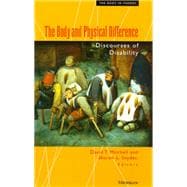
| Foreword | |
| Introduction: Disability Studies and the Double Bind of Representation | p. 1 |
| Constructions of Physical Disability in the Ancient Greek World: The Community Concept | p. 35 |
| Nude Venuses, Medusa's Body and Phantom Limbs: Disability and Visuality | p. 51 |
| Disfigurement and Reconstruction in Oliver Wendell Holmes's "The Human Wheel, Its Spokes and Felloes | p. 71 |
| Defining the Defective: Eugenics, Aesthetics, and Mass Culture in Early-Twentieth-Century America | p. 89 |
| In Search of Al Schmid: War Hero, Blinded Veteran, Everyman | p. 111 |
| Conspicuous Contribution and American Cultural Dilemmas: Telethon Rituals of Cleansing and Renewal | p. 134 |
| Feminotopias: The Pleasures of "Deformity" in Mid-Eighteenth-Century England | p. 161 |
| "A Prisoner to the Couch": Harriet Martineau, Invalidism, and Self-Representation | p. 174 |
| "It Is More than Lame": Female Disability, Sexuality, and the Maternal in the Nineteenth-Century Novel | p. 189 |
| The "Talking Cure" (Again): Gossip and the Paralyzed Patriarchy | p. 202 |
| From Social Welfare to Civil Rights: The Representation of Disability in Twentieth-Century German Literature | p. 223 |
| Disabled Women as Powerful Women in Petry, Morrison, and Lorde: Revising Black Female Subjectivity | p. 240 |
| Muteness and Mutilation: The Aesthetics of Disability in Jane Campion's The Piano | p. 267 |
| "Making up the Stories as We Go Along": Men, Women, and Narratives of Disability | p. 283 |
| Contributors | p. 297 |
| Table of Contents provided by Blackwell. All Rights Reserved. |
The New copy of this book will include any supplemental materials advertised. Please check the title of the book to determine if it should include any access cards, study guides, lab manuals, CDs, etc.
The Used, Rental and eBook copies of this book are not guaranteed to include any supplemental materials. Typically, only the book itself is included. This is true even if the title states it includes any access cards, study guides, lab manuals, CDs, etc.